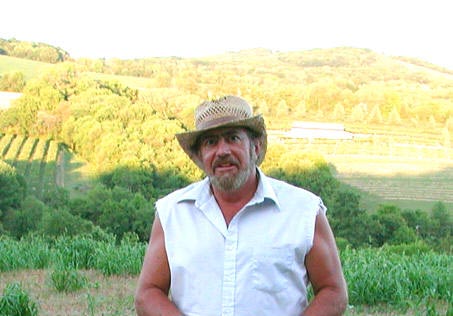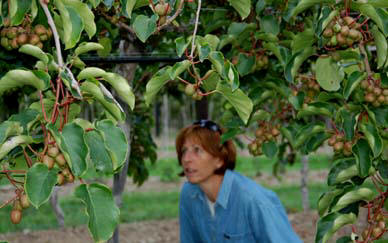|

|
 |
Following a lengthy career in music, David returned
to his passion of growing plants for the future.
After researching many different possibilities that
would suit the Pennsylvania climate, he chose hardy kiwi. David founded
Kiwi Korners, his organic farm located in Northeastern Pennsylvania, in
1988.
|
|
David Jackson |
|
He
devotes his attention to every aspect of the farm, and carries out a
good portion of the arbor management himself.
He is also always at the
end of the pack-line making certain that product quality stays at the
"impeccable" level.
One of Dave's life goals is to achieve "genuine originality".
By choosing hardy kiwi as a crop, and learning by trial and error how to
grow, manage, and successfully market the fruits of his labor, I would say
that he has shaken hands with originality.
His
mission is to seek out the absolute best varieties of hardy kiwi to grow,
and in turn offer folks a "good for you" nutritious, and outrageously
great tasting tropical treat.
____________________________________________
|
Holly
joined David at Kiwi Korners in 1990. Her interest in research was a
timely addition for the test trials that were initiated with hardy kiwi.
She is involved in all aspects of
KiwiBerry Organics and Kiwi Korners Farm operations that includes the
farm's organic
certification, research data, and coordinates with Dave on arbor
maintenance, harvest, packaging, logistics, distribution, and marketing. |
 |
| |
Holly Laubach |
She holds
degrees in visual arts, and has graduate level teaching and accounting in
her background which support her efforts as the KiwiBerry Organics
webmaster and financial manager.
____________________________________________
Both
David and Holly completed a fellowship in the Rural Leadership Program,
RULE, in the College of Agricultural Sciences, at Penn State University,
PA where they focused their leadership skills in sustainable agricultural
systems and education.
As
agricultural researchers, they have dedicated themselves to the
development of multi-cultivar hardy kiwi, actinidia arguta, as a viable,
organic, sustainable, commercial crop for the past twenty-seven years.
They employ three persons throughout
the year, and add up to thirty more for harvest.
|

|